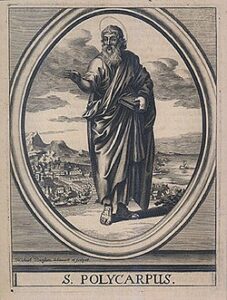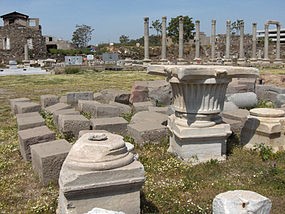History: Bible does not record the founding of the church at Smyrna. Most likely the church began during Paul’s Ephesian ministry (Acts 19:10) by Paul or one of those he reached. At the end of 1st century life became very difficult for Smyrna. Many Christians faced bitter persecution. The most famous of Smyrna’s martyrs was Polycarp, executed in 155 AD. Polycarp was a disciple of Apostle John who was ordained as a Bishop of Smyrna by Apostle John. He was regarded as a Saint in Roman Catholic churches and Lutheran churches.

Polycarp AD(69-155)
Smyrna was an ancient city whose origins are lost in history. About 600 BC Smyrna was destroyed by Lydian’s and in 290 BC, Alexander’s successor rebuilt the city. Smyrna citizens were loyal to Rome that they built a temple in 195 BC. The city was completely destroyed in 2nd century AD, but Emperor Marcus Aurelius rebuilt it. The city was said to be the most beautiful city in Asia. It was located on the gulf of the Aegean Sea and had an excellent harbour.
At one end of the city had pagan temples of Zeus, Cybele, Apollo, Asclepius and Aphrodite. The city was noted for science and medicines. While the harbour of Ephesus eventually silted up and the city went out of existence, Smyrna survived numerous earthquakes and fires and exists today as the Turkish city of Izmir.

Ruins of ancient Smyrna
Appreciation: (2:9). The church at Smyrna was not having an easy time of it! The members were persecuted, probably because they refused to compromise and say, “Caesar is Lord.” Smyrna was an important centre of the Roman imperial cult, and anyone refusing to acknowledge Caesar as Lord would certainly to live in unemployment and in utter poverty.
A large Jewish community also thrived in Smyrna. The Jews, of course, did not have to patronize the imperial cult since their religion was accepted by Rome; but they certainly would not cooperate with the Christian faith. So, from both Jews and Gentiles, the Christians in Smyrna received slander and suffering.
But they were rich! They lived for eternal values that would never change, riches that could never be taken away. “As poor, yet making many rich” (2 Cor. 6:10; 8:9). In fact, their suffering for Christ only increased their riches.
Our struggles are not with flesh and blood, but with the enemy, Satan, who uses people to accomplish his purposes. The Jewish synagogue was actually a synagogue of Satan. Unbelieving Jews commonly accused Christians of cannibalism (misunderstanding of the Lord’s Supper), immorality (based on a perversion of the holy kiss with which believers greeted each other), breaking up homes (when one spouse became a Christian and the other did not, it often caused conflict, atheism (because Christians rejected the pagan pantheon of deities), and political disloyalty and rebellion (because Christians refused to offer the required sacrifices to the emperor). Hoping to destroy the Christian faith, some of Smyrna’s wealthy, influential Jews reported these blasphemous, false allegations to the Romans.
The church at Smyrna had every human reason to collapse. Instead it remained faithful to Christ, never leaving its first love like Ephesus. For that reason, Jesus said to them, “You are rich.” They had what really mattered viz., salvation, holiness, grace, peace, fellowship, a sympathetic Saviour and Comforter.